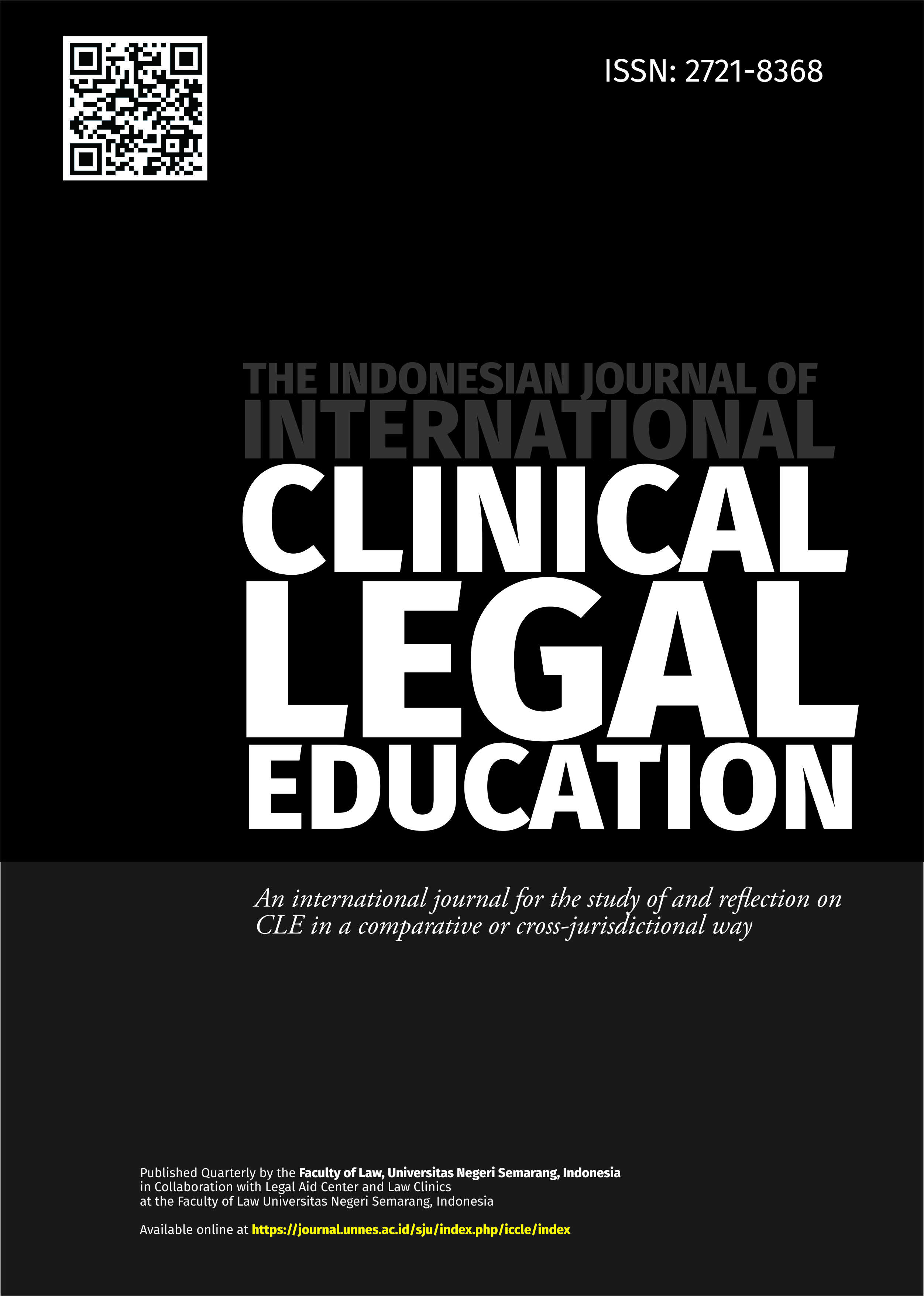Clinical Legal Education in Indonesia Objectives and Advantages
Main Article Content
Abstract
Clinical Legal Education (CLE) in Indonesia embodies a transformative approach to legal education, with distinct objectives and advantages. CLE's primary goals include enhancing practical skills, bridging the gap between theory and practice, and fostering a sense of social responsibility. Through real-world engagement, students develop crucial skills like legal research, client counseling, and courtroom advocacy. The objective of promoting community engagement aligns with Indonesia's commitment to social justice, encouraging legal practitioners to address the needs of marginalized communities. Additionally, CLE contributes to ethical and professional development, guiding students through real ethical dilemmas to establish a robust ethical foundation. The interdisciplinary nature of CLE promotes collaboration with professionals from various fields, providing students with a holistic understanding of legal issues and their broader societal implications. The advantages of CLE in Indonesia are manifold. Graduates with CLE experience exhibit enhanced legal competence, making them highly sought after by employers. This practical skill set not only increases employability but also positions graduates to excel in a rapidly evolving legal landscape. The networking opportunities facilitated by CLE contribute to the building of professional relationships crucial for career advancement and mentorship. Moreover, CLE students become agents of legal reform, actively contributing to improvements in the legal system and its responsiveness to societal needs. In essence, CLE in Indonesia stands as a catalyst for producing socially conscious, skilled legal professionals equipped to address the challenges of the legal profession.
Article Details

This work is licensed under a Creative Commons Attribution-ShareAlike 4.0 International License.
The copyrights of the article in Indonesian J. Int'l Clinical Leg. Educ. is on the Author(s), however, before publishing, it is required to obtain written confirmation from Author(s) in order to ensure the originality (Author Statement of Originality). The statement is to be signed by at least one of the authors who have obtained the assent of the co-author(s) where applicable. This work licensed under a Creative Commons Attribution-ShareAlike 4.0 International (CC BY-SA 4.0). All writings published in this journal are personal views of the authors and do not represent the views of this journal and the author's affiliated institutions.
References
Arifin, Ridwan. "Clinical Legal Education for Human Rights Issues: How Students Can Implement Their Basic Knowledge of Human Rights in Reality." International Conference on Clinical Legal Education 1, no. 1 (2017).
Arifin, Ridwan. "Democracy on Indonesian Legal Reform: How Can People Participate on Laws and Regulations Establishment Process." Journal of Indonesian Legal Studies 2.2 (2017): 155-158.
Bloch, Frank S., ed. The global clinical movement: Educating lawyers for social justice. (Oxford: Oxford University Press, 2010).
Chesterman, Simon. "The globalisation of legal education." Singapore Journal of Legal Studies July 2008 (2008): 58-67.
Kusumaatmadja, Mochtar. "Pendidikan Hukum di Indonesia." Jurnal Hukum & Pembangunan 24.6 (2017): 491-501.
Sastroatmodjo, Sudijono, and Dani Muhtada. "Internationalization of Legal Education in Indonesia: Insights from Faculty of Law Universitas Negeri Semarang." International Conference on Clinical Legal Education 1, no. 1 (2017).
Widiatedja, I. Gusti Ngurah Parikesit. "Fostering Social Justice through Managing Civil Law Clinic in Indonesia: A Comprehensive Framework and Practice." Mulawarman Law Review (2018): 1-14.
Wilson, Richard J. The global evolution of clinical legal education: More than a method. (Cambridge, MA: Cambridge University Press, 2017).
